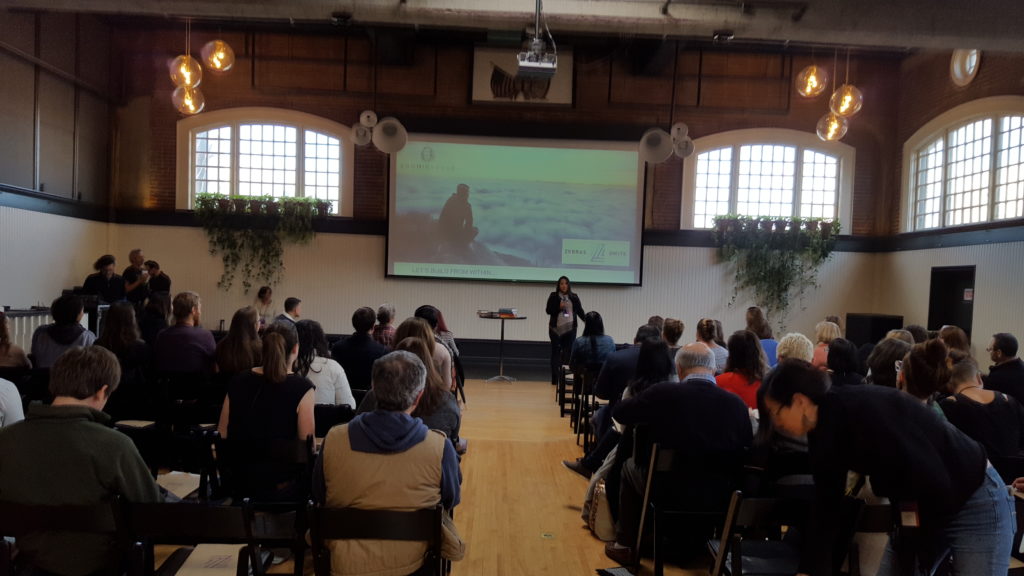We can’t solve problems by using the same kind of thinking we used when we created them.
-Albert Einstein
You’re a founder of a startup and you’ve been frustrated with the challenges of accessing resources. As such, you’re looking for ways to create different structures or alternative ways of doing business. Sometimes you feel isolated and think you’re alone in your efforts. You want to build something of impact, but you are constantly spending energy to fight the current business paradigm.
Imagine the hundreds of other founders in the same predicament.
Last month in November, BoominGroup teamed with Booming Collective to share their research and experience with ZebrasUnite at the DazzleCon conference. The founders of ZebrasUnite created DazzleCon to gather founders from social impact startups who shared the same struggle. Their objective was to start the conversation about what a solution could look like.
When trying to think outside the box, no one points it out better than Albert Einstein. So we ask, are we using the same kind of thinking we used, to create the problems?
I interviewed Katherine Silveira to gather the event’s highlights and to push the conversation further: what we can do to create a different type of business, under a more equitable business paradigm?
The first step? An inward look.
DazzleCon Highlights with Katherine Silveira
ReThink Business: What was DazzleCon’s main focus? What were some key topics or issues that the conference hoped to address?
Katherine Silveira: There were entrepreneurs from different backgrounds in different industries, and they were experiencing the same lack of opportunities, or they weren’t being seen, or simply felt in isolation. One of the topics we tried to uncover was why this was happening. The other topic was around funding–whether or not underrepresented groups (ie. Blacks, Hispanics, women in tech) were being overlooked or not receiving funding, and not having the same access to resources out there. Last was how to stay true to their values and the impact they want to make through their companies and how hard it was to continue doing business. The current business paradigm didn’t fit them and they felt they were spending energy and resources just to fight and protect that aspect of their business. So in order for them to succeed they needed to drop their values.
ReThink Business: So was there a consensus as to WHY these things were happening?
Katherine Silveira: No…we didn’t necessarily come up with a conclusion or a consensus. It was a way to be heard and starting the conversation and hopefully articulate what it is we needed to do as a movement.
However, during the process of getting ready for the conference, other things were raised that came to our attention: (like) entrepreneurs asking for simple business skills, or how to create business models that integrate their vision and the impact they wanted to create.
I found it helpful to see how they articulated their needs:
I want to make this impact and here I am running this business, and I want to do it in a way that is aligned with my values. I don’t want to sacrifice my values in order to get funding. I don’t want to do it without funding, but I don’t know which business model fits.
They were asking for real business skills. They expressed that there weren’t any resources out there, as in, “this is how you create a business model; this is how you do a financial forecast.” That’s where I feel like the resistance comes from.
If we are trying to create a different kind of company that’s built on impact and the only resources available to them to learn how to build is based on traditional business, then there’s already an impasse.
We didn’t conclude anything…no unique answers, but we discussed possible ways, different methodologies–from vision creation to legal aspects. There was exposure to new ideas which many of us felt we were lacking.

ReThink Business: What did founders have in common with each other? What conversations did you have that suggested there’s a need for a movement like Zebras?
Katherine Silveira: What I found across attendees is they needed resources and they felt lonely and isolated. Those two themes were very strong across. I also sensed we were in sort of a victim mentality. Why not come more from a place of power and creation? A few, I remember, were able to articulate what it meant to shift the energy from ‘victim to power’. I believe it was Carol Sanford and Ari Weinzweig who spoke that you can not change the external without changing yourself first. It’s that self-responsibility and looking in that I believe allows us to think outside the box of how we can experience business differently.
ReThink Business: What types of businesses were represented among these Zebra companies?
Katherine Silveira: The call was for technology companies. But some were not. Some were in non-profit, in the clothing business but using technology in some format. I also met a person who has a coffee shop. He buys coffee from families who want to stick to their values. Majority were technology but other industries. The founders are in tech, but there were other industries there.
ReThink Business: What recurring limitations were you able to identify or observe in the stories or conversations you might have had with other founders?
Katherine Silveira: The biggest question for me really was, “what are you willing to change about yourself first before expecting a whole system to change?” There’s energy willing to emerge there, but I didn’t feel the willingness to go there. When you come from a place of contribution vs ‘neediness’, that’s when I believe things start to flow. This is where I felt the recurring limitations were coming from.
ReThink Business: How do you envision this movement going forward?
Katherine Silveira: I think that before a movement can go forward, we first have to give ourselves the space to go inward. And it’s important that each individual has the tools. So before we attempt to think outside the box and ask what can we do to get resources differently, can we begin from the starting point? What am I doing, or how am I showing up? I envision a movement of 100 people willing to do their inner exploration and maintain business as a day-to-day practice and start to look at the business from “self” first. It reveals the root of what’s really going on and allows us to take actions that address the immediate, solvable issues at hand.
ReThink Business: What was your biggest takeaway from this gathering, and why?
Katherine Silveira: Ari Weinzweig facilitated a working session with us on Friday and while getting to know him, I learned he wrote about ‘the power of belief systems’ in business. That was my biggest takeaway. It doesn’t matter as much what it is that we want to create, if we don’t take the time to go inward to take a look at our fundamentals, our beliefs, we risk letting our subconscious operate as an autopilot which ends up running the show most of the time without us knowing. The danger with that is we end up just replicating the same thing. When you’re trying to build a different kind of business, you also have to come from a different thinking.
His businesses and BoominGroup run similarly where value is added in every touchpoint within the business and within the ecosystem of businesses. He relates “anarchy” not so much to the political definition we know more popularly as “no rules or structure”, but to individuals with a belief system coming together to form a bigger organism.
This is also how I see what happens in business: if you are able to identify what your beliefs are around work ethics, business as a discipline, around vision, about planning, about strategy, about teamwork, then you can begin to go to the root of the problem. So sometimes the immediate inclination to solve something is to jump into solutions like, “teamwork and collaboration”, but if in your belief and subconscious you’re accustomed to different ideas of “teamwork and collaboration”, then it won’t really solve anything. Then it becomes our responsibility to get to know what the difference is in our belief systems.
ReThink Business: What’s the significance of understanding your belief systems?
Katherine Silveira: We did a values exercise. And in that exercise, we went over values that represent themselves as individuals. And we had discussions of whether integrity is the same for one another. Knowing one’s belief is a big step.
For example, what is your own belief around business as a practice, as a discipline? “For me business is just to make a living,” or “for me, business runs the world.” There are two completely different values and both are true. There’s nothing right or wrong . . . it’s just your answer.
Let’s take technology for example. Let’s say I’m building a technology company and I want to create a different business structure. If I ask myself, “what is your belief around technology?”, I may say that my belief is that technology amplifies impact and allows us to scale, but then I also think technology is the root of all evil. So when I’m running my company and bringing people into the business, then I may act on my subconscious belief that technology is the root of evil without knowing it. So here, you will have a behavioral and energetic contradiction. That’s where the importance of digging into what your belief systems are.
ReThink Business: What then after that? What do you do with understanding your beliefs versus just showing up subconsciously?
Katherine Silveira: So there two possibilities: there’s acceptance and you show up exactly as you believe, or you can make a shift.
For example, if I hate technology because I think it’s the root of all evil then I accept it and perhaps I create the intention so that technology is used specifically for good. The other option is that now I know I was rooted in these fundamental beliefs, but let me do the work so I can make the necessary changes. In other words, “I don’t think that belief serves me anymore, so let me get rid of it and shift that belief.”
ReThink Business: So going back to earlier’s question on how you envision this movement going forward . . . if everyone was willing to do the work and the inner exploration, what would be the outcome be of that?
Katherine Silveira: The outcome would be that we are able to address the more immediate need. If I look inward and examine my beliefs, maybe the immediate need is really something else. So I feel that the outcome would be that we are able to address the specific need of the individual from that angle.
I had a few conversations, for example, with founders who decided to be in business but don’t like business itself. Yes, they wanted to change the system, and yes they like the solution they are providing, but they don’t like business. They believe business is a necessary evil. So the question becomes, do I need to address why you’re not getting funding? Or is it a different issue that needs to be addressed? If you are using business as a route to manifest that solution, then you either have to accept it and suck it up, or you address and work out how to approach business differently and shift your subconscious.
The outcome is something intangible. The real authenticity of the outcome is that you really get to discuss and tackle the root of the problem. It’s from this point that you can pivot and think outside the box.





